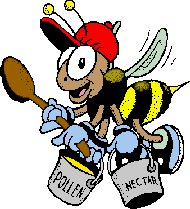
Nature's only perfectly complete food is found in the honey bee hive. Pure bee pollen is a natural source of at least 13 vitamins, 28 minerals, 18 amino acids, 11 enzymes or co-enzymes, 14 beneficial fatty acids and 11 carbohydrates! It is a regular part of Olympic athletes' diets. The honey bee collects only the best pollen from the most vital part of the plant, mixes it with nectar and carries it back to the hive. There, it is stored and eaten as the primary protein source for the "busy bees".
Bee pollen is used worldwide as a daily supplement for energy and general good health. It is a natural alternative to help fight allergies, hay fever, hormonal imbalances, and skin problems. Studies have also proven its ability to strengthen the immune system and restrain tumors! In one instance, a track coach fed one half of his team Bee Pollen and the other half none. The portion of the team on Bee Pollen was able to re-energize more quickly and consistently have fast track scores after repeated heats around the course! The other half of the team had times that progressively decreased in speed.
Bee pollen is a concentrated food and is generally taken several times daily in amounts totaling 1 to 2 table spoons, depending on your body's needs. For beginners, 1/8 tsp. per day at breakfast for the first week, increasing another 1/8 tsp. each week until working up to larger amounts. Remember 3 tsp. = one table spoon and I normally take 1 or more tsp. with each meal or when ever I feel like it during the day. Those with high sensitivity or severe allergic discomfort or and are allergic to pollen should begin by eating 4 granules at meal time, increasing by 4 at each following meal, until reaching a desired quantity! Bee pollen can be sprinkled on hot or cold cereals, mixed into salads, yogurts, shakes, spread on a sandwich or just eaten plain. You can even find bee pollen in soaps, shampoos and facial cleansers!
The taste and color of bee pollen will vary according to the time of year and location from which it is gathered. Bees collect pollen from a variety of sources, including flowers, orchard fruits and agricultural plants. Fresh pollen will maintain its vitamin strength longer when kept in the freezer and loses its vitality when cooked or heated. It is recommended that it be kept refrigerated or frozen.
One pound of pollen contains approximately 31 tablespoons (measured). Each tablespoon is equal to about .516 ounces or 14.7 grams. Everyone on this earth is different so once you feel you are approaching perfect health and feel you have more energy and stamina than ever before, then you must personally regulate the amount of pollen you eat each meal for life.
M & M Bees mandmbees@hotmail.com (806)-797-7182 www.mandmbees.bizland.com <><
We offer many other products of the hive, so please visit our website.
Fresh pollen is currently selling for $1.75 per ounce as available.